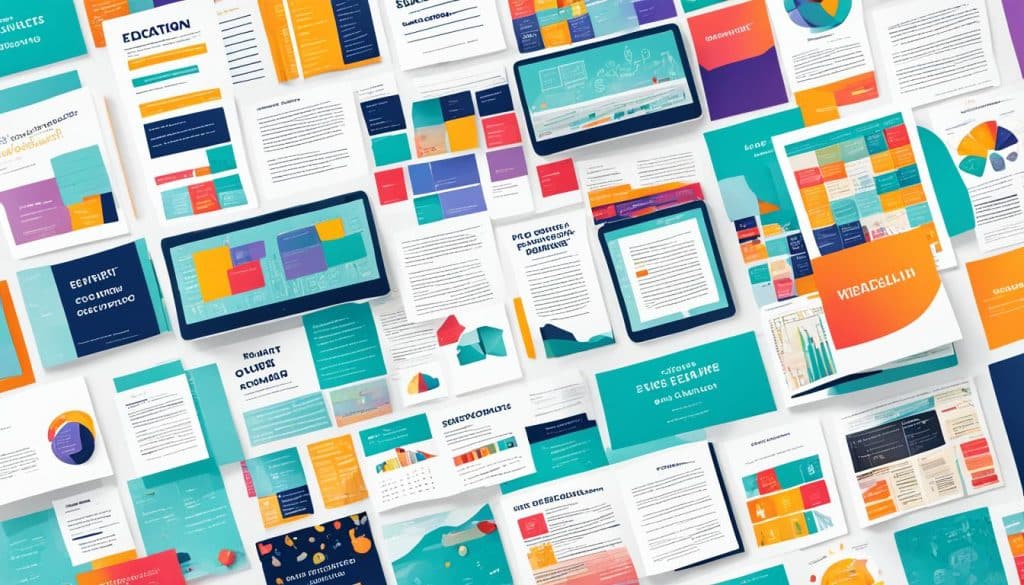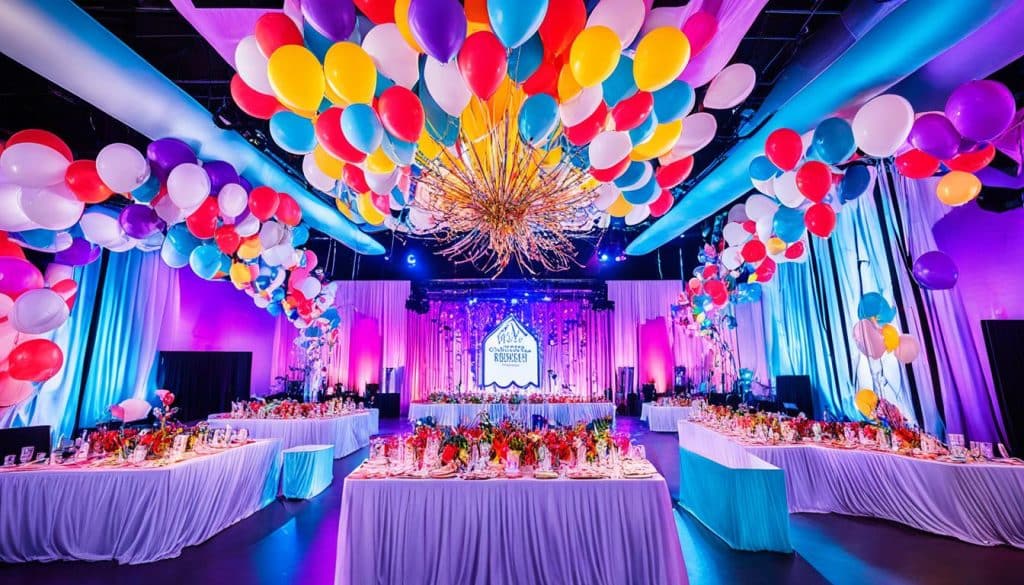Are you passionate about bringing people together for unforgettable experiences? Do you love being organized and creative? If yes, a career in event planning could be ideal for you. But how do you start and stand out in this thrilling field?
This article will guide you on how to become an event planner. We’ll discuss the importance of education and skills needed. Plus, we’ll talk about showcasing your creativity and logical thinking. These are key to a successful career in event planning.
We’ll look at various career paths, entry-level jobs, and the role of education and experience. Networking and joining industry groups are also crucial for making connections and keeping up with trends.
Key Takeaways:
- Educational qualifications and certificates can enhance your employability as an event planner.
- Networking is essential for building relationships and opening doors in the industry.
- Showcasing your creativity and experience through staged event photos and an online presence can set you apart.
- Combining logical and creative thinking is crucial in event planning.
- Exploring different types of event planners and considering starting your own business are viable career options.
The Importance of Education in Event Planning
Education is key in event planning. It gives you the knowledge and skills needed to do well. Even if you don’t need a degree, getting special training can really help your career. It opens up exciting job opportunities in the industry.
Getting an education in event planning gives you a strong base in the events and hospitality sectors. Many colleges offer degrees in event management or hospitality management. These courses cover important topics like event logistics, budgeting, marketing, and managing clients. They prepare you for the quick-paced event planning world.
There are also short courses and certificates available. These are taught by experts and focus on specific areas like event design, marketing, and technology. They offer great networking chances and show you’re serious about learning and growing in your career.
Investing in event planning education gives you an edge in the job market. Employers like candidates who are eager to learn and grow. Having the right qualifications and certifications proves your skills and commitment. This makes you stand out when applying for jobs and helps move your career forward.
Benefits of Event Planning Education:
- Gain foundational knowledge in the events and hospitality industries
- Develop essential skills in event logistics, budgeting, and client management
- Access industry-specific courses taught by experienced professionals
- Expand your professional network through educational programs
- Showcase your commitment to continuous learning and professional development
- Achieve a competitive edge in the event planning job market
For those wanting to start a career in event planning, education and training are vital. Whether you go for a degree or get certifications, learning the right skills will help you succeed in this exciting field.
Skills and Qualities of an Event Planner

To be a top event planner, you need a mix of skills and qualities. These skills help you shine in this fast-paced field. From being super organized to having great communication skills, here are the key traits every event planner should have:
- Organization: Planning events means paying attention to every detail and staying on top of tasks and deadlines.
- Collaboration: Working well with clients, vendors, and your team is key to making events a success.
- Adaptability: Being able to adjust to changes and handle surprises is a big plus for event planners.
- Creativity: You need to come up with new ideas and find unique ways to make events unforgettable.
- Focus: Keeping your eye on the goal and staying focused is crucial for a successful event.
- Multitasking: Event planners juggle many tasks at once, making sure everything runs smoothly.
- Budgeting: Being good with money is important for keeping events on budget.
- Communication: You need to be great at sharing ideas, negotiating, and working with others.
- Composure: Keeping calm when things get stressful is important in event planning.
- Networking: Having a strong network of contacts is key for finding resources, opportunities, and working with others.
- Negotiation: Being good at negotiating helps you get the best deals with vendors and suppliers.
- Travel: Event planners often have to travel for venue checks, conferences, and managing events on-site.
But there’s more to event planning than just these skills. Getting better in areas like public relations, marketing, design, accounting, and management can really boost your skills. Using skills from past jobs and building a varied experience portfolio can also help you succeed in this exciting field.
Showcasing Your Creativity and Skills
It’s key to stand out as an event planner by showing off your creativity and skills. A great way to do this is by making an event planning portfolio. This portfolio should show off your best work and prove you can design and run unforgettable events.
Adding event photos to your portfolio helps show off your skills visually. These photos should show the special touches of each event. They should highlight your creativity, eye for detail, and skill in making visions come to life.
To get amazing event photos, work with local photographers, bridal shops, rental agencies, models, and venues. Together, you can plan events just for photos. These events will show off your talent in a big way.
Building a strong online presence is also important. Instead of being on many platforms, pick one or two that fit your audience best. Share great content regularly on these platforms.
Have a professional website for people to see your portfolio and learn about your services. It should show off your unique style and how you work. Also, keep a physical portfolio for meetings and events, with real examples of your work.
Starting a blog is another great way to be seen online. Share tips, stories, and insights from your event planning work. This makes you look like an expert. You can also write for other planners’ blogs or send your work to publications to get more people to see it.
Getting testimonials from happy clients is powerful too. Put these on your website and in your portfolio. They prove you’re good at what you do and build trust with potential clients.
Logical and Creative Thinking in Event Planning

Event planning is all about balancing logical and creative thinking. It’s about paying attention to every detail and coming up with new ideas. Both skills are key to making events successful.
Logical thinking helps with budgeting and planning the event’s layout. A good budget keeps costs in check and ensures everything is covered. A well-planned layout makes the event flow smoothly and improves the experience for everyone there.
Event planners also need to be great at organizing. They must keep track of many things at once. Paying attention to small details is important to avoid big problems later. By thinking logically, planners can spot and fix issues before they become big problems.
Creative thinking is just as important. It helps make events special and memorable. By coming up with unique themes and branding, planners can make the event feel more real and engaging.
Creative thinking also helps with designing promotional materials. Eye-catching graphics grab attention and build excitement. This makes people look forward to the event.
Being creative is also about making the event memorable for attendees. By coming up with new and exciting activities, planners can leave a lasting impression. These experiences make people talk about the event and help the organizers build a good reputation.
In conclusion, both logical and creative thinking are vital for event planners. Logical thinking keeps things running smoothly, while creative thinking makes events stand out. Finding a balance between the two leads to unforgettable events that leave a mark.
Tools and Resources for Event Planning
When planning an event, the right tools and resources are key. They help whether you’re planning a corporate event, a charity fundraiser, or a wedding. These tools can make your work easier and improve your results.
Graphic Design Platform
A graphic design platform is crucial for event planning. Canva is a top choice for planners. It’s easy to use and has many templates. With Canva, creating posters, invitations, flyers, and social media graphics is simple. This helps promote your event and connect with your audience.
Event Planning Tools
Tools designed for event planning can simplify your work. Social Tables is a great tool that helps with event layouts, guest management, and seating. It lets you plan your event layout and manage attendee details well. This ensures a smooth experience for everyone.
Grammar Checker
Good communication is key in event planning, and that means clear grammar and tone. Grammarly is a free tool that improves your writing with its grammar and tone checks. It helps make sure your invitations, emails, and other materials impress your audience.
Scheduling App
Event planners need to keep track of meetings and appointments. Appointlet is a scheduling app that makes managing your calendar easy. It helps you avoid scheduling problems and stay organized during the planning phase.
Website Themes
Having a website is important for promoting your event planning services. WordPress offers many themes for event planners. These themes look great and are easy to use. They help you show off your work and attract new clients.
Wedding Venue Inspiration
For wedding planners, Wedding Spot is a great resource. It’s a platform that helps find venues, read reviews, compare prices, and get inspiration. With Wedding Spot, you can find the perfect venue and make your clients’ weddings unforgettable.
Using these event planning tools and resources can boost your efficiency, creativity, and professionalism. They help with everything from designing visuals to managing guest lists and promoting your services online. These tools are essential for event planning.
Exploring Different Career Pathways in Event Planning

Event planning is a diverse and exciting field with many career paths. Whether you love organizing weddings, corporate events, or charity fundraisers, there’s a spot for you. By looking into these options, you can find a role that matches your skills and dreams.
General Event Planning
General event planning lets you work on a variety of events, from small parties to big conferences. You’ll need to be organized, pay attention to details, and manage several tasks at once. As a planner, you’ll work with clients, vendors, and other pros to make events happen.
Wedding Planning
Wedding planning is great if you love romance and creating magical moments. Wedding planners help couples make their dream weddings come true. They pick venues, vendors, and manage every detail. You’ll need good people skills, creativity, and an eye for beauty.
Corporate Event Planning
Corporate event planners focus on events for businesses. These can be conferences, seminars, product launches, or company retreats. You’ll work with clients to meet their goals and match their brand and culture. You’ll need strong project management skills, professionalism, and the ability to work under tight deadlines.
Nonprofit Event Planning
Nonprofit event planning is for those who want to make a difference. You’ll plan fundraisers, galas, and charity events to support causes. Working with nonprofits, sponsors, and volunteers, you’ll need good communication skills, empathy, and the ability to build relationships.
Conference and Trade Show Planning
Conference and trade show planners organize big events like industry meetings, trade shows, and exhibitions. These events bring together professionals to share knowledge, network, and explore business opportunities. You’ll need excellent organizational skills, strategic thinking, and the ability to handle complex logistics. Knowing about event technology is also important.
Social Event Planning
Social event planning is perfect if you’re great at making parties and celebrations unforgettable. You’ll work with clients to plan events like birthday parties, anniversaries, and reunions. Creativity, good people skills, and the ability to stick to budgets are key. You should also keep up with event trends and have an eye for style.
Exploring these event planning paths can help you find your perfect role. This can lead to a rewarding and exciting career in this fast-paced industry.
Starting Points for Entry-Level Event Planning Jobs
Starting your career in event planning is exciting and rewarding. If you’re looking for entry-level jobs, there are several starting points to consider. These can help pave the way for your future success.
Volunteering for local events in your community is a great way to gain experience. You’ll work alongside experienced planners and learn the basics of event coordination. This not only gives you practical skills but also shows your commitment to the field.
Internships are another good option for starting your career. Many companies offer internships that provide training and mentorship. Working with professionals lets you see the real-world challenges and responsibilities of event planners.
Assistant roles are also a good starting point. They let you work with event planners and see different parts of the business. As an assistant, you’ll learn from experts and understand their work processes. This helps you develop a broad skill set in event planning.
Sales coordinator positions offer a unique view of event planning by focusing on client management and sales. This role teaches you about the sales process and how to communicate with clients to meet their needs.
Event tech support roles are important in today’s digital world. They give you knowledge of event management software and tech solutions. Working in tech support helps you become an expert in event technology and ensures events run smoothly.
Working as a catering coordinator gives you insights into the catering side of event planning. You’ll help with menu planning, logistics, and execution. This role teaches you about coordinating food and beverage services for different events.
Starting your career in entry-level event planning jobs like volunteering, internships, or assistant roles is a great way to grow. These jobs help you develop key skills, network with professionals, and gain practical experience. They set you up for success as you move forward in your career.
The Value of Education in Event Planning

Getting a degree isn’t a must to be an event planner, but education is very valuable. It gives you the right knowledge and skills. This can boost your career and open new opportunities.
For formal education, you can look into getting a bachelor’s degree in event planning or a similar field. These programs cover all you need to know about event planning. You’ll learn about logistics, marketing, budgeting, and how to manage clients.
Many UK universities offer these degrees. They give you both theory and practical skills through internships. This is great for building your skills and making industry contacts.
Alternative Education Options
If you want a shorter education path, consider event industry certifications. They offer specialized training and are quicker than a full degree.
There are many certifications for event planners. The Skills Network has a Level 2 Certificate in Event Planning. It teaches you about planning, budgeting, and marketing. The Events Industry Council offers the Certified Meeting Professional (CMP) certification, known worldwide. Meeting Professionals International has the Certificate in Meeting Management (CMM) for those wanting to move up in their careers.
Certifications give you the knowledge and skills you need. They also prove your expertise, making you stand out to others.
The image above shows the education choices for event planning: degrees and certifications.
It’s important to think about these options to build a strong base in event planning. Whether you go for a degree or certifications, your education will prepare you for the event planning world.
The Role of Experience in Event Planning
Experience is key in event planning. It gives you the practical skills needed to do well in this fast-paced field. You can gain experience in several ways, helping you grow and shine in your career.
Freelance work is one way to get experience. It lets you work with various companies on different events like corporate meetings, weddings, and charity events. This way, you learn to handle many types of events and improve your skills.
Another path is to work as an assistant to a seasoned event planner or join an event planning firm. Here, you learn from experts and get real-world experience. You’ll help with picking venues, managing vendors, and planning budgets, which is great for learning the ropes.
There are other roles in the event industry that can also give you valuable experience. For example, working in sales coordination, event tech support, or catering coordination lets you focus on specific areas. These jobs help you understand event logistics, technology, and how to manage clients, making you a versatile event pro.
Volunteering or interning can also be a great way to get hands-on experience. You work with experienced planners, learn the best practices, and help make events successful. Plus, it’s a chance to meet industry people and make connections that could help your career later.
Getting relevant experience in event planning boosts your skills and builds a strong portfolio. This portfolio shows your abilities to potential clients and employers. The experiences you get from freelancing, assisting, and volunteering prove your dedication and make you a trusted event pro.
Image:
Networking in the Event Planning Industry
Networking is key in the event planning world. It helps professionals make connections that lead to new opportunities. For those aiming to shine in this field, having a strong network is essential.
Attending events hosted by hospitality groups is a great way to network. These events gather professionals from different areas. It’s a perfect chance to meet people who can share valuable insights and help you out.
When networking, notice how people act and look for those who are friendly. Being open and curious can make you stand out. Ask real questions and share your own stories to build strong bonds with others.
Handing out business cards wisely is also key. Don’t just give them out randomly. Wait for someone to ask for one and use it to deepen your connection. Remember, having a few quality connections is better than many cards.
Following up with people you meet is vital. Send them a thank-you note within 24 hours, mentioning something you both liked. This keeps your meeting fresh in their mind and helps build a lasting connection.
Being part of professional groups and going to industry events also helps with networking. These groups often host events where people from the event planning field meet. Going to these events can lead to new partnerships and a chance to share knowledge and build relationships.
By networking, event planners can grow their professional networks, learn new things, and open doors for future projects and career moves. Networking is a key part of doing well in event planning.
Industry Associations and Resources for Event Planners
For a successful career in event planning, it’s key to link up with industry groups. These groups offer great resources and chances to meet others. They help event planners improve their skills, learn more, and keep up with new trends.
The National Association of Wedding Professionals is a top group for event planners. It brings together planners, vendors, and experts to share knowledge and work together. Joining means you get to meet experienced pros who can help and support you.
The Association of Event Organisers is another great group. It links event planners across different areas. It offers chances to share knowledge and grow professionally. You can go to events, learn from workshops, and meet people who might be your clients or partners.
For a global network, check out MPI and ILEA. MPI is a worldwide group for event pros, with educational stuff, networking, and certifications. ILEA is all about live events and lets you show off your skills, learn from leaders, and be at the cutting edge of event trends.
The Institute of Event Management is a top place for getting certified. They have courses on all things event planning, from the basics to advanced strategies. Getting certified here shows you’re a pro and can attract clients and jobs.
Being part of these groups and using their resources can really boost your career. It doesn’t matter if you’re new or experienced. Joining these groups is a smart move for success.
Image:
Exploring Different Types of Event Planners
Event planning offers many career paths for people with different skills and interests. By looking into the various types of event planners, you can learn about the wide range of jobs out there. This helps you find a career that matches your skills and interests.
General Event Planners
- General event planners work on a variety of events like conferences, corporate parties, fundraisers, and social events.
- They have a wide range of skills. This lets them manage different parts of event planning, including budgeting, logistics, vendor management, and coordination.
Wedding Planners
- Wedding planners focus on planning and organizing weddings.
- They work with couples to make their wedding day perfect and memorable.
- They help with choosing venues, managing vendors, planning the budget, creating timelines, and designing the event.
Corporate Event Planners
- Corporate event planners plan events for businesses, like product launches, conferences, trade shows, and team-building activities.
- They know what corporate clients need and are great at organizing big events with a focus on detail and professionalism.
Nonprofit Event Planners
- Nonprofit event planners help organizations plan fundraisers, charity galas, and other events for a cause.
- They use their communication and people skills to get sponsors and donors for fundraising.
Conference and Trade Show Planners
- These planners are experts in organizing big events like industry conferences, exhibitions, and trade shows.
- They handle complex tasks, including picking venues, managing registrations, speakers, exhibitors, and making sure attendees have a good time.
Social Event Planners
- Social event planners plan parties, celebrations, and family events.
- They are great at making social events memorable and fun. They take care of everything from picking venues to planning the menu.
Learning about these event planner types helps you see the career paths in the event planning industry. You can specialize in a certain area or be a general event planner. There are many chances to use your skills and make a big impact for clients and guests.
Starting Your Own Event Planning Business
If you dream of starting your own event planning business, there are steps to follow. First, create a business plan. This should include details about your target market, services, pricing, and how you’ll market yourself. Make sure to register your business and get any needed licenses or permits.
Set up a professional online presence, like a website and social media accounts. Develop a pricing plan that shows the worth of your services. Then, start growing your client list through networking, word of mouth, and targeted marketing.
As your business grows, think about adding more staff and offering different services for various events. Starting your own event planning business takes hard work and a good grasp of the industry. But, it can give you the freedom and flexibility of being your own boss.
The Future of Event Planning
The event planning industry is always changing. It’s crucial for planners to keep up with new trends and use technology. Looking forward, several key areas will shape event planning’s future.
Virtual and hybrid events are becoming more popular. Thanks to tech, these events are now more engaging. Planners must use event tech like virtual platforms and apps. These tools make events better and let people join in from anywhere.
Sustainability is also a big topic now. Event planners should focus on being eco-friendly. They can reduce waste and use green energy to make events better for the planet.
Data analytics and AI will be big in event planning soon. These tools help planners make better decisions and improve events. They can look at what people like and how to market events better.
By keeping up with new trends and using technology, event planners can keep giving great experiences. The future of event planning looks bright. With change, the possibilities are endless.
















